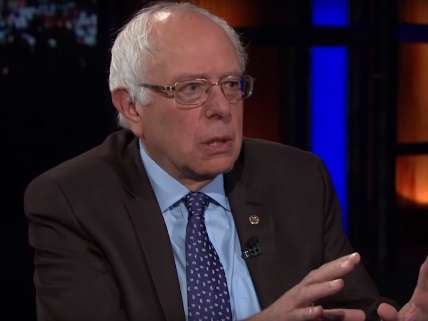Bernie Sanders' Critics, Supporters Are Ignoring the Most Admirable Thing About Him
A restrained foreign policy isn't a weakness. It's a strength.


Bernie Sanders—the man who doesn't even own a tuxedo—is having a good month. He's catching up to Hillary Clinton in national polls, has matched her in Iowa, and is ahead in New Hampshire. As a result, liberal journalists who previously regarded his candidacy as a lark—albeit a useful one for pushing Clinton leftward—are increasingly scrutinizing his incoherent economic policy.
New York Magazine's Jonathan Chait recently offered "The Case Against Bernie Sanders," which rests upon the candidate's assumption—incorrect, in Chait's view—that a complete revolution against the current political order is both practical and necessary. Chait also observes the following:
The paradox is that the president's ability to deliver more change is far more limited. The current occupant of the Oval Office and his successor will have a House of Representatives firmly under right-wing rule, making the prospects of important progressive legislation impossible. This hardly renders the presidency impotent, obviously. The end of Obama's term has shown that a creative president can still drive some change.
But here is a second irony: Those areas in which a Democratic Executive branch has no power are those in which Sanders demands aggressive action, and the areas in which the Executive branch still has power now are precisely those in which Sanders has the least to say. The president retains full command of foreign affairs; can use executive authority to drive social policy change in areas like criminal justice and gender; and can, at least in theory, staff the judiciary. What the next president won't accomplish is to increase taxes, expand social programs, or do anything to reduce inequality, given the House Republicans' fanatically pro-inequality positions across the board. The next Democratic presidential term will be mostly defensive, a bulwark against the enactment of the radical Ryan plan. What little progress liberals can expect will be concentrated in the non-Sanders realm.
Chait is actually glossing over a considerable advantage of Sanders' candidacy—at least, from a libertarian standpoint. Sanders has not vowed to expand the powers of the executive branch, he has not promised new foreign entanglements—and has criticized those favored by his Democratic and Republican rivals—and he remains a steadfast opponent of the Patriot Act and unlimited federal spying on American citizens. With the obvious exception of Rand Paul, Sanders is almost completely alone in this regard.
Indeed, it's worth recognizing that among the five most plausible presidential candidates at this stage of the campaign—Donald Trump, Ted Cruz, Marco Rubio, Clinton, and Sanders—there is only one articulating something approaching a libertarian position on a chunk of issues: civil liberties and foreign policy. That candidate is Sanders.
One can argue, of course, that Sanders' sensible views on these subjects are more than cancelled out by his desire to impose higher taxes and cumbersome financial regulations on the American people. I would agree that the "bad" column outweighs the "good" column in Sanders' case, as it does for virtually every politician seeking higher office. But while there's little to like about Sanders beyond his praise for Edward Snowden and condemnation of military adventurism, there's virtually nothing to like about any of his rivals. When it comes to government policy, Sanders has signaled his preference for executive restraint on at least a few issues, which is more than Clinton, Trump, Cruz, or Rubio can say. He deserves some small praise for his stances on these issues, regardless of whether his liberal critics view them as a weakness.


Show Comments (62)